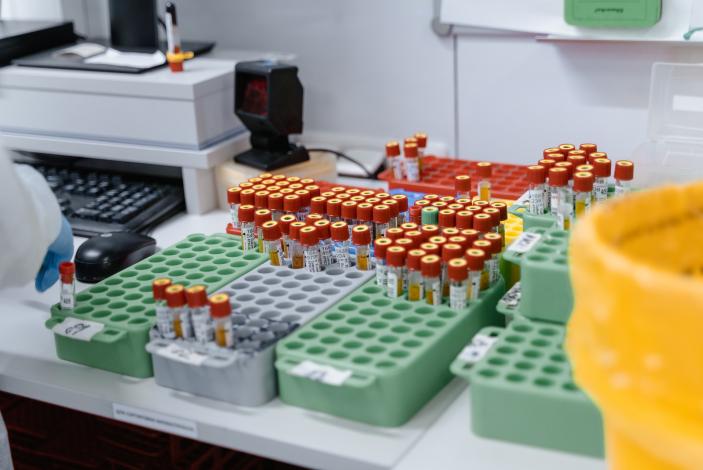
Underperformance in biotech stocks impacts innovation, health care solutions

As the world reached the second anniversary of the formal declaration of the COVID-19 pandemic by the World Health Organization, there is consensus among scientists and policymakers that the return to pre-pandemic life unavoidably entails the widespread application of vaccines and the use of effective, newly authorized antivirals. Uncertainty about the next stages of the pandemic remains, but it is clear that the world would be in a significantly worse condition, both economically and from a public health perspective, without mRNA vaccines like those for COVID-19 and other therapeutics.
These two developments – COVID-19 vaccines and anti-viral drugs – illustrate the importance of the biotech sector to society. After the completion of human genome sequencing by the Human Genome Project in 2003, the biotech sector has attracted investors’ attention with groundbreaking developments like gene therapy, with its potential application to a variety of medical conditions, from different types of cancer to Alzheimer's disease.
A recent study shows that, under conservative assumptions, an expected total of almost 1.1 million patients will be treated by gene therapy between January 2020 and December 2034. The positive outlook implies that biotech stocks should be outperforming the equity market. As business majors know from their core finance classes, equity prices should embed future cash flow expectations, which in this case should be notably positive.
Surprisingly, stock prices over the past year tell us a completely different story. The biotech stock ETF XBI, for example, reached its peak in January 2021, just a few weeks after recently approved COVID-19 vaccines were administered to seniors and health care workers, but then lost about 40% of its peak market value.
In my recent article with Vijay Govindarajan (Dartmouth College), Hassan Ilyas (Cornell University), Anup Srivastava (University of Calgary) and Luminita Enache (University of Calgary), we argue that, beyond reasons specific to the COVID-19 pandemic, there are structural features of the biotech sector that shed some light on this puzzling underperformance.
Biotech projects such as the development of a new drug entail substantial risks because of the inherent scientific complexity and the necessary regulatory hurdles that must be overcome for the product to be given to human subjects on large scale. This means that biotech projects have risks and payoffs that resemble lotteries: a high probability of failure coupled with a low-probability large reward.
The supply chain of innovation typically starts with individual scientists or entrepreneurs, often affiliated with top-notch laboratories and universities, working on projects that build upon state-of-the-art biotech research and are often funded by government grants. Some of these ideas may be turned into startup firms – of which the most promising would receive equity financing from venture capitalists. Those that pass the first economic milestone may undergo the next stages of financing such as an IPO or acquisition by big pharma firms. Scientific and regulatory complexity means that out of many synthesized molecules, only a few would turn out to be viable products. As financial markets drive this innovation chain, financial frictions impose inefficiencies on the entire process.
How it happened
An example of how the risks of drug development affect the productivity of real investments in this sector is summarized by the so-called Eroom’s law: the inflation-adjusted cost of developing a new drug roughly doubles every nine years. This observation contrasts with Moore’s law, which highlights the decreasing costs and increasing investment efficiency over time for other forms of technologies, such as computer processing and electronics.
Experts propose a variety of plausible explanations for the recent underperformance of the biotech sector. One of them is simply an undesirable spillover from COVID-19-related efforts, meaning that researchers and capital providers simply diverted their attention towards COVID-19-related developments. Relatedly, the FDA’s backlog of trial approvals has increased significantly during the pandemic, imposing bottlenecks to the approval of new treatments for many diseases.
Another plausible explanation is a well-known behavioral bias: extrapolation. That is, the underperformance of the sector is explained simply because its valuation in early 2021 was already abnormally high due to investors extrapolating the success of COVID-19 vaccines.
Another explanation lies in the sharp increase in biotech IPOs in 2020 and 2021, including a record number of “pre-clinical” firms. Competition for capital and high IPO valuations may have exacerbated the subsequent underperformance. Disentangling these market forces and ascribing a causal interpretation to the overall phenomenon is a Sisyphean task. Nevertheless, the practical implications of the sector’s underperformance are worth noting.
Impacts to the biotech sector
Our key conclusion is that the underperformance of the biotech sector will likely come with important negative consequences to society. Lower biotech valuations mean that lottery-like payoffs become less attractive from a financial perspective. That means fewer incentives for biotech scientists to turn their research into startup businesses and fewer incentives for capital providers to invest in such early-stage projects. The natural consequence of the break in the innovation chain described above is that less successful products or ideas will be purchased by big pharma and undergo FDA regulatory approval to become viable treatments.